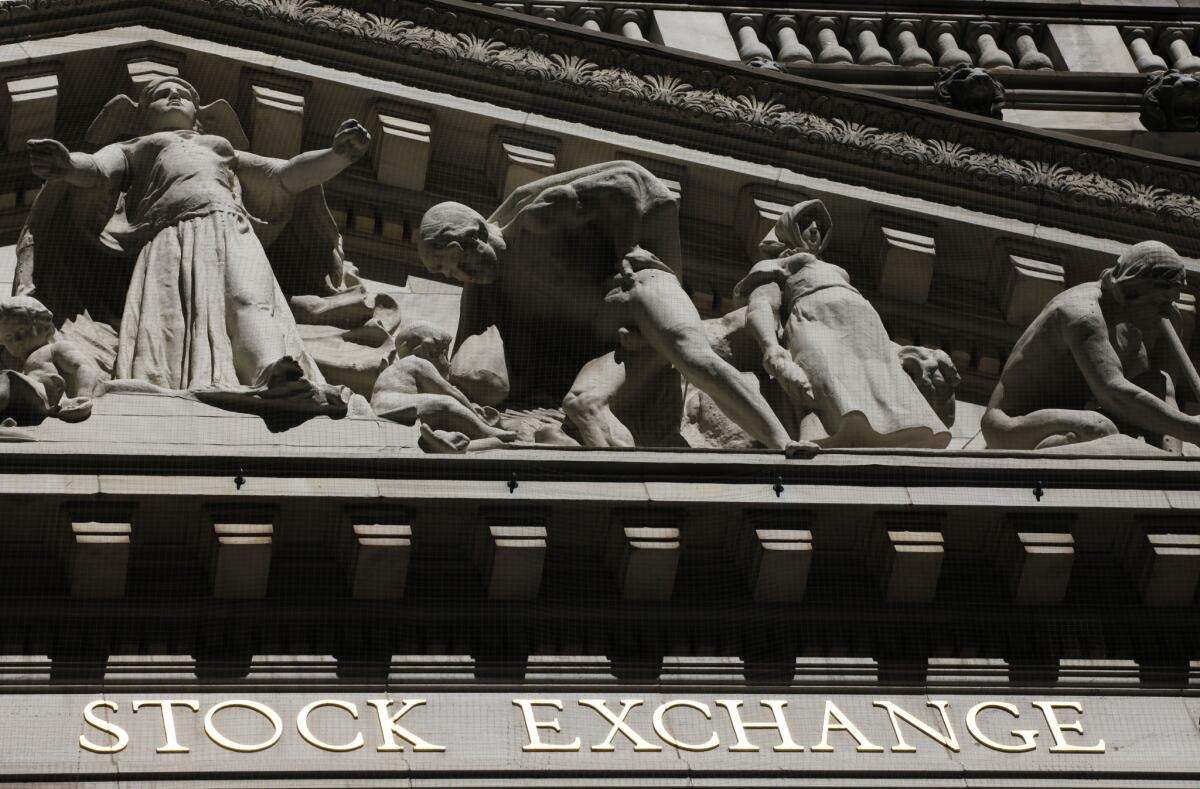Stocks start 2017 with solid gains; healthcare companies jump

- Share via
U.S. stocks broke a three-day losing streak Tuesday and ushered in the new year with broad gains. Healthcare stocks, which struggled for most of last year, climbed.
Stocks started the day with a surge as the Dow Jones industrial average rose 175 points in the first hour of trading. Bond yields jumped, which took bank stocks higher. The price of oil also rose early in the morning, but it soon began slipping. Investors started buying again late in the day, however, and major indexes closed with a flourish.
Energy companies, banks and technology companies made some of the largest gains, and traditionally lower-risk investments such as utility companies lagged behind the rest of the market. That’s a sign investors expect stronger economic growth.
“Corporate earnings are telling us that it’s a bull market,” said Karyn Cavanaugh of Voya Investment Strategies. Cavanaugh said earnings and revenues look “very good” for 2017.
The Dow Jones industrial average rose 119.16 points, or 0.6%, to close at 19,881.76. The Standard & Poor’s 500 index climbed 19 points, or 0.8%, to 2,257.83. The Nasdaq composite jumped 45.97 points, or 0.9%, to 5,429.08.
The Russell 2000 index, which tracks small-company stocks, rose 8.36 points, or 0.6%, to 1,365.49. The Russell rose almost 20% last year and did far better than indexes focused on larger companies.
Drug companies helped take healthcare stocks higher. Merck rose 2.2% to $60.15. Thousand Oaks biotech giant Amgen advanced 3.1% to $150.73 and San Francisco prescription drug distributor McKesson climbed 5% to $147.43. Depomed jumped 12.9% to $20.34 after the New York Post reported that private equity firm KKR might buy the Newark, Calif., drugmaker.
The S&P 500’s healthcare index fell 4% last year. The S&P 500 itself rose 9.5% for the year, and all of its other industrial sectors rose at least a small amount.
Investors have been avoiding drug company stocks because they’re worried that the government will intervene to reduce prices. But Cavanaugh said the stocks are appealing because they’ve been reporting better growth than most other industries.
“If you look at earnings and revenues, they’re one of the leaders,” she said.
Xerox surged 19.8% to $6.89 after the company split itself in two, a move it announced almost a year ago. The original Xerox kept its printer and copier business. The second company will focus on business process outsourcing, providing payment processing and other services. Xerox will receive $1.8 billion in cash. The new company, Conduent, now trades under the ticker symbol “CNDT.” That stock sank 7.9% to $13.72.
Oil prices jumped in early trading but turned around to finish lower. U.S. crude fell $1.39, or 2.6%, to $52.33 a barrel. Brent crude, used to price international oils, fell $1.35, or 2.4%, to $55.47 a barrel.
Despite that slump, energy companies traded higher. But natural gas companies dropped as natural gas futures dived 40 cents, or 10.7%, to $3.33 per 1,000 cubic feet. Southwestern Energy shares declined 7.9% to $9.97 and Cabot Oil & Gas fell 4.4% to $22.34.
The manufacturing sector continued to recover and ended 2016 on a strong note. The Institute for Supply Management said its manufacturing index rose to 54.7 in December, its highest reading of the year. That was the fourth straight month of expansion and the ninth out of the last 10. The result was a bit stronger than analysts expected.
Santa Clara, Calif., graphics processor maker Nvidia slid 4.4% to $102.01. The stock more than tripled in value last year, but it hit a wall in the year’s final days of trading. It’s down 13% since Dec. 27, when it closed at an all-time high.
Bond prices fell slightly. The yield on the 10-year Treasury note rose to 2.45% from 2.43% late Friday. Yields made a much bigger move earlier in the day.
Utility companies fell Tuesday, and real estate investment trusts and companies that sell household goods rose less than the rest of the market. Those stocks are often compared to bonds because they pay large dividends, but the jump in yields Tuesday encouraged investors to look elsewhere.
The price of gold rose $10.30 to $1,162 an ounce. Silver rose 42 cents, or 2.6%, to $16.41 an ounce. Copper fell 2 cents to $2.49 a pound.
In other energy trading, wholesale gasoline fell 5 cents, or 2.9%, to $1.62 a gallon. Heating oil fell 5 cents, or 3%, to $1.68 a gallon.
The dollar jumped to 117.68 yen from 116.78 yen. The euro slumped to $1.0410 from $1.0531.
The FTSE 100 index in Britain rose 0.5% to another all-time high. The French CAC 40 rose 0.3%. Germany’s DAX slipped 0.1%. Hong Kong’s Hang Seng index gained 0.7% and the Kospi in South Korea rose 0.9%. Tokyo’s stock market remained closed for the New Year’s holiday.
ALSO
Sen. Elizabeth Warren wants to pull pot shops out of banking limbo
With Imax’s Marvel experiment, theaters look to TV shows to fill seats
In a social experiment, Finland starts giving a $587 monthly income to 2,000 citizens
UPDATES:
2:30 p.m.: This article was updated with closing prices, context and analyst comment.
1:10 p.m.: This article was updated with the close of markets.
7:50 a.m.: This article was updated with market prices and context.
This article was originally published at 7 a.m.
More to Read
Inside the business of entertainment
The Wide Shot brings you news, analysis and insights on everything from streaming wars to production — and what it all means for the future.
You may occasionally receive promotional content from the Los Angeles Times.










